Captain Ajax: Let's be realistic – we're fighting with sticks and stones. It all comes down to numbers
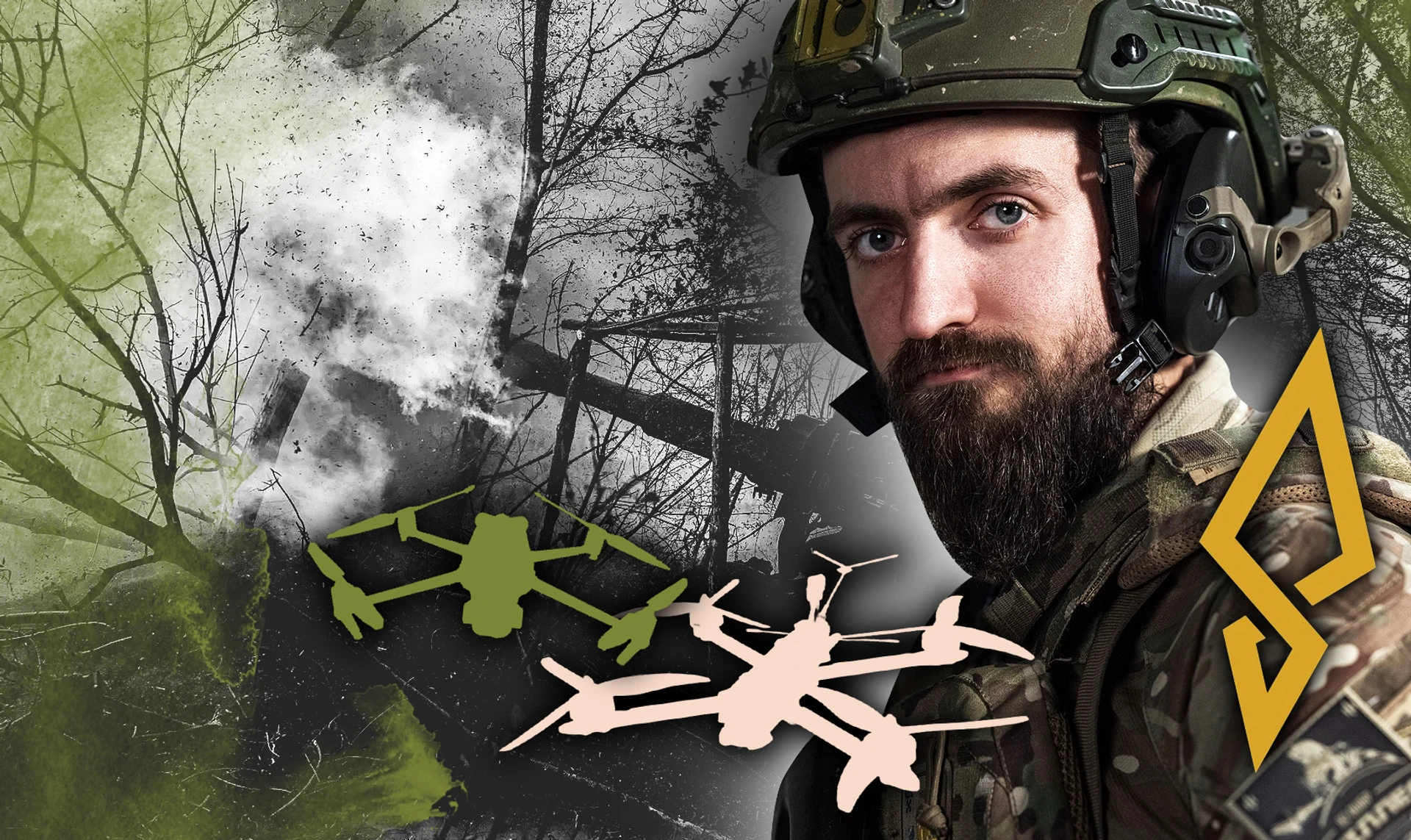
What do you experience when you’re hit by artillery fire 27 times in the space of a few hours?
You press yourself into the ground, bracing yourself for death during each of those 27 strikes. Your hearing fades. Your vision goes dark. When the shaking finally stops, you slowly sit up, blindly groping for your helmet. You find it, and you try to put it on, but soil falls out of it onto your face. If you’re lucky, your sight will return after a while.
Ajax regained his sight, and his hearing partially returned. Today he is the deputy commander for weapons of the Achilles Battalion, which specialises in UAVs. He is also an engineer, gunsmith, drone workshop manager, and test pilot.
Captain Taras Shandura (alias Ajax), 33, is one of the key figures who have made drones a game-changer in this war. Often, it was his decision that determined whether a particular development would be deployed on the battlefield. He was part of the team that created the first FPV drone units and believed in the legendary "Baba Yaga" attack drone.
But he’s unlikely to be talking about this at ceremonial gatherings when the war is over. He’s an introvert by nature – someone who avoids noisy events, crowds, pompous speeches and unnecessary attention. There’s sadness in his eyes, and an unspoken question: "What do you want from me?"
His eyes have not always been filled with sorrow. Some of his comrades believe the sadness appeared after a particular moment in the Battle for Bakhmut when he blindly groped around for his helmet and a rifle that had been reduced to nothing but a stock.
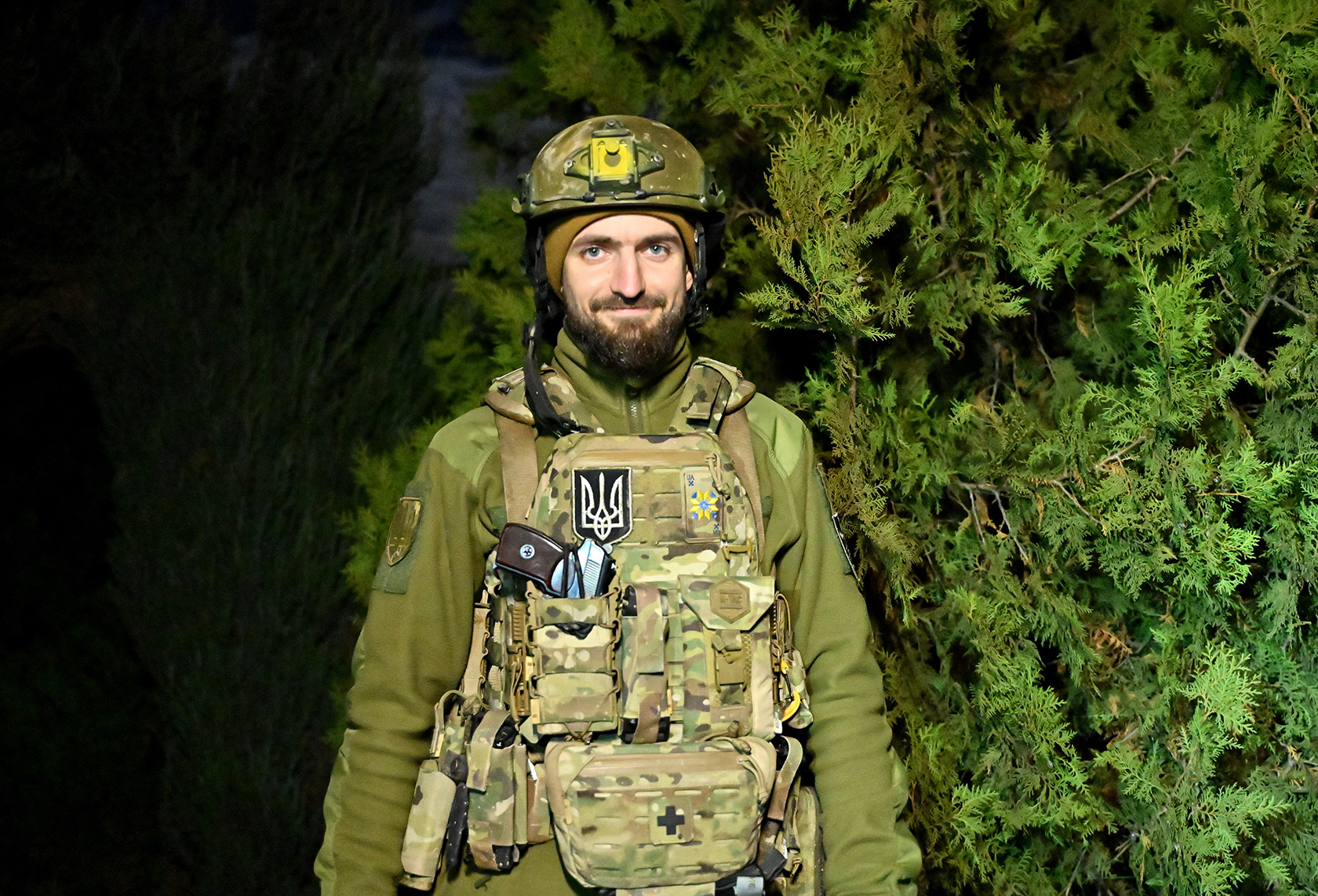
September 2022
Kharkiv, autumn 2024. Ajax is drinking hot coffee from a thermos before heading to the front lines. The wind blows an autumn leaf onto the car bonnet. The fallen leaf is a metaphor for memories. Fallen Leaves, a song written after World War II by the French composer Joseph Kosma, is playing from the car’s speakers.
What memories does the autumn leaf evoke for Ajax? September 2022, the liberation of Slobozhanshchyna (a historical region in northeastern Ukraine), the battles for Kupiansk.
"That day, we were already on the left bank of the Oskil River," he recalls.
Ajax describes the mines left by the Russians, the smell of blood that seeps into your clothing and never fades. He recalls how a mortar vehicle under his command was blown up by a mine near their position. The ammunition inside detonated.
"When we rushed over," the captain continues, "we saw that all that was left was the front wheels and the front seat, with the driver strapped into it. The rest of the bodies were scattered around. One of them appeared completely unharmed – he was lying on his back, all in one piece. But he wasn’t breathing. I ran over to another – his stomach had been ripped open, his intestines were exposed. Another guy had broken legs. The next one had been torn apart, his legs twisted in different directions, half of his backside ripped off. A bowl had formed where his pelvis had been, filling with blood."
Ajax brushes the leaf off the car bonnet and goes on with his story.
"We applied tourniquets and bandaged up the wounded. I tried to do everything as fast as I could. We called for an evacuation vehicle, but it took an hour to arrive… a whole hour! By the time it got there, only two of the five wounded soldiers were still alive. One of them died on the way to the stabilisation point. Only the driver survived."
A day passed, then a night, and then the situation pretty much repeated itself.
"I was heading to the position with my comrade Darwin," Ajax continues. "I was driving. A pickup truck came towards us, swerved off the track to avoid us, and hit a mine. There were four people in it. Two of them didn’t make it. We bandaged up the other two and shoved them into our car. It was getting dark, it was raining, and the road was muddy. I got stuck, the car just wouldn’t move. Darwin and I dragged the wounded guys to the main road, laid them on the asphalt, flagged down a car, and sent them off to the evacuation point. But then the command sent an evacuation vehicle for those soldiers, and it hit a mine too."
During that time, Ajax's combat team gained a new member.
"They added a mortar man called Hulk to our crew," he recalls. "One day, me, Darwin, Bot and Hulk arrived at a new position. The guys were unloading a generator and dragging it into the wooded area. I drove the car a little further to hide it under some trees. As soon as Hulk and Bot stepped into the forest, Hulk triggered an anti-personnel mine. Boom. Darwin threw Hulk a paracord and we pulled him out..."
Ajax goes on: "Hulk’s ankle was completely torn off. I looked down, and his foot was just lying on the path – a chunk of his boot... like it had been sliced off by a guillotine. Hulk was lying face down.
We slowly flipped him onto his back. And then… right under his stomach, we found another mine. When we’d dragged him with the paracord, his body armour had snagged it. And he had a machine gun ammo belt on him... It would have blown everything to pieces. We got lucky though. As we were pulling him, an empty vodka bottle had ended up under his stomach – there was a lot of rubbish in the grass. His body armour was resting on the bottle, so the pressure on the mine wasn't enough to trigger it."
After a brief pause, Ajax reflects on the incident.
"The boot was still there on the path... it haunted me. I thought maybe the ankle could still be saved. But it was too dangerous to go into those bushes to search for the missing part of the leg. I blamed myself for not going. But later the doctor told me, 'Don’t worry, there would have been no chance of reattaching it – the leg was shattered up to the knee. Hulk held on incredibly well, he’s an unbelievably strong person...'"
"All of this happened within a week," Ajax sighs. "It really took a toll on us. After the last incident, Achilles [the alias of the commander, Yurii Fedorenko – ed.] gave us two days off and told us to go to church and light a candle…
During those days, I came up with a formula for myself: 'If you want someone to survive, rely on yourself. The lives of your comrades – and your own life – are in your hands.'"
But Ajax is talking about drones, not tactical medicine. His story is that of an engineer at war, a journey that began long before 24 February 2022.
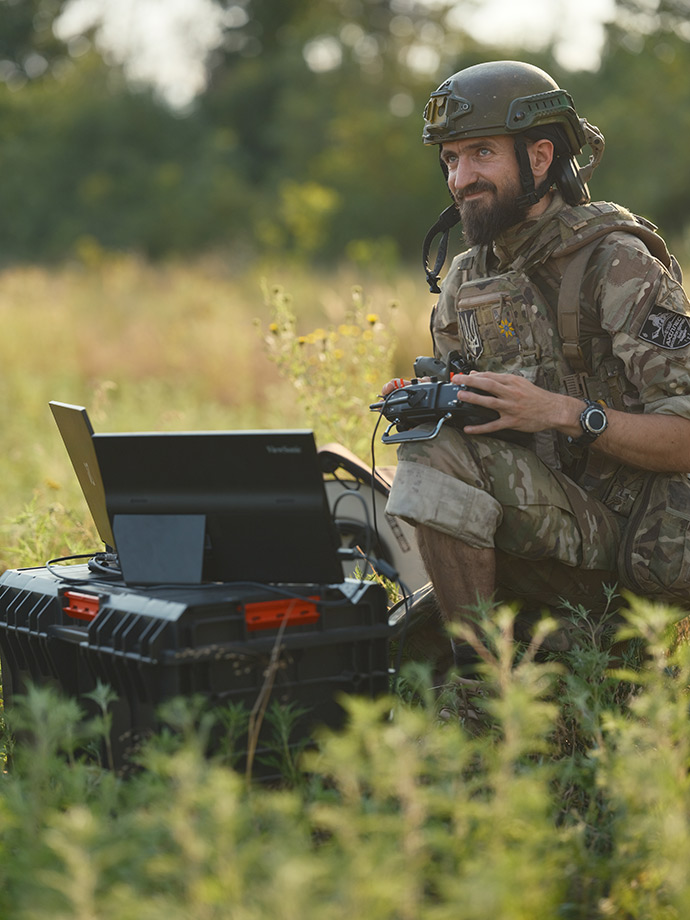
The path to war
When Taras turned 12, he received a model kit for his birthday: a Soviet T-34 tank and a German King Tiger. Taras – now Ajax – smiles as he remembers that toy: "It was a high-quality kit, very detailed – the Tiger's tracks were even made of individual links."
That gift sparked Taras's passion for model-making. He started with tanks and later moved on to aeroplanes. When he left school, he enrolled in the National Aviation University (NAU), where he graduated with honours. He went on to work as an engineer, and in his spare time, he enjoyed travelling, airsoft and shooting.
On day one of the full-scale invasion, he went straight to the military enlistment office. At 32, an aircraft designer by profession, he believed drones could change the course of the war. He formed the first Mavic drone unit in his battalion, and later, the first FPV drone unit.
But in reality, it wasn’t like that – or rather not exactly like that.
It wasn’t a straight path. Along the way, there would be unforgettable model tanks and aeroplanes, mountain hikes, and many other jigsaw pieces that would later fit together to form the picture of this officer in one of Ukraine’s most technologically advanced military units. But the true story of Ajax’s early life is full of paradoxes, contradictions, and moments of doubt – far from a straightforward trajectory.
Born in Kyiv, Taras attended a secondary school with an advanced English programme. He describes his academic performance as average. The subject that should have been key for a future aircraft designer – physics – was one he didn’t enjoy, mainly due to his dislike of the teacher.
He did better in chemistry. His parents were chemists, so he knew the school curriculum in advance. But he didn’t particularly enjoy chemistry either. Among the teachers who shaped him as a person, Ajax remembers his form tutor, who taught world literature. Through analysing literary works, she taught him to distinguish between good and evil.
While he was at school, Taras read the whole of The Lord of the Rings by J.R.R. Tolkien. I ask him which character he identified with, expecting him to say Gandalf, as Ajax somewhat resembles the wizard. But he smiles. "No, I didn’t have a beard back then. I liked Legolas."
In Tolkien's legendarium, Legolas is an elven warrior, the son of the King of the Woodland Realm. Taras spent his holidays with relatives in Volyn Oblast, in Ukraine’s northwest. And what are the forests of Volyn if not an elven realm? Later, he became passionate about hiking in the mountains and forests, mountaineering, and airsoft. The great war with Mordor was yet to come. But none of this related to his career path.
Taras didn’t like any kind of systematisation. He didn’t even have much luck with extracurricular activities. But ultimately his interest in model-making had an impact – he applied to the National Aviation University in Kyiv. "I was drawn by the opportunity to train as a pilot," Ajax says, smiling again.
The pilot training, however, had to be paid for, and Taras couldn’t afford it. That was definitely a downside. The upside was that the technical disciplines turned out to be quite interesting: "I graduated with honours."
After university, Taras became an engineer at Antonov, the state-owned aviation company. But when he got married, he had to find a job that paid better.
He worked in wind energy and IT for a while. Family, work, hobbies… What else? There was an unsettling feeling, like a distant hum, of something ominous approaching – something Ajax himself describes as a "complete shitshow". Like the elf Legolas, he could sense that Mordor was looming.
During the Euromaidan protests, Ajax and his father took shifts on the barricades and at first aid points. Then [in 2014] came the war, and his family was affected.

Could the future soldier have believed that one day there would be a full-scale war? "I didn’t believe it," he says, adding, "To be honest, I didn’t want to believe it. But I was preparing for something like that just in case, including practising shooting."
Ajax is one of those people you don’t need to ask why he became a volunteer when the full-scale invasion began. Likewise, there’s no need to ask why he chose his callsign.
The alias Ajax evokes several associations. First, there’s Ajax Systems, the IT company where Taras worked for two years before the full-scale war. Second, Ajax is the name of a character in the Marvel Cinematic Universe who famously doesn’t feel pain. Third, Ajax is the name of two veterans of the Trojan War. Ajax from the Achilles Battalion has something in common with each of these images.
The essence of this war
"He’s a unique expert who knows everything about UAVs and can fly anything," is how Rustam Nurhudin, aka Dzhyn, the chief of staff for the Achilles Unmanned Strike Aviation Systems Battalion, describes Ajax. "But that’s now. Back when we started service together in the reconnaissance platoon, neither of us knew much – we’d bicker, we’d learn..."
"Rustam and I quickly realised that we couldn’t accomplish anything in our sector without the Mavic drone," Ajax says. "We brought another fighter into our group, Rasta [who was killed in 2022 – ed.]. When Achilles saw the Mavics in action, he started to develop this area. A lot of people in the company were still sceptical about UAVs at the time, but the commander won them over. You could say he pushed the idea that UAVs are the future."
Thanks to the Mavic drones, they managed to build up a substantial intelligence database. "We knew exactly what was happening in our zone. This was partly what laid the groundwork for the successful Kharkiv counteroffensive," Ajax believes.
"Later the same thing happened with FPV drones, with night bombers…" he explains. "I showed how FPVs work, I believed in them. I demonstrated what a Baba Yaga drone could do in combat. We started sharing our experience, gaining more experience."
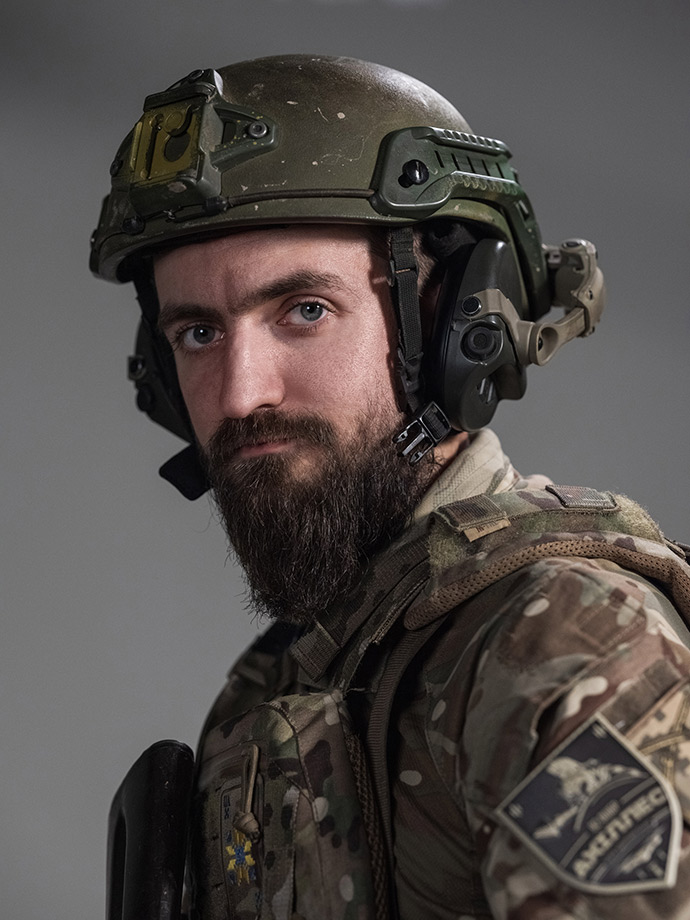
Ajax is a sceptical realist by nature. His words are devoid of sentimentality, and his remarks are often ironic, sometimes brutally so. "We’re holding on not because of Leopards, HIMARS or Abrams tanks. Those machines are here and they do their job brilliantly, but there aren’t enough of them. We’re holding on thanks to low-cost solutions."
"Mavics and FPVs are the essence of this war," Ajax explains. "Let’s be realistic – we’re fighting with sticks and stones. Those f**kers are fighting with sticks and stones too. We can laugh at the T-55, but it’s still a tank. Quantity is what matters. So the main thing is for our sticks and stones to be scaled up. That will have the maximum impact."
Listing all the technical solutions Ajax has been involved in might give the impression that he’s spent the whole war working as an engineer or test pilot. In reality, however, his domain in 2022 and early 2023 was combat – minimal theory, maximum practice.
The battle for the Garden Centre
At around 15:00 on 22 March 2023, the Achilles company command post received information that there were four dead Achilles fighters, including the team leader, Ajax, at a position near the village of Khromove.
A soldier from a neighbouring unit had witnessed the scene: radios, Starlinks, antennas and other FPV gear scattered far and wide, and four Achilles comrades lying buried in the dirt. He had seen and felt the blast wave from the Russian shell firsthand: he was wounded and concussed in the same blast.
Despite his injuries, he managed to jump into a nearby captured Tigr vehicle and quickly left the zone of fire. He didn’t know that within a matter of minutes, his wounded and concussed comrades would be beginning to get up.
In the first few moments after the explosion, Ajax lost his vision – "the picture went dark". Blindly, he reached for his combat helmet and tried to put it on. Soil spilled out from the helmet onto his burned face. Suddenly "the picture turned back on" – his sight returned.
"I saw that everything had been blown apart," Ajax recalls. "All that was left of my rifle was the stock and part of the firing mechanism. The headphones on my head had been shattered by the blast wave. Where was my phone? My phone was in my face – tiny fragments of it were embedded in my skin. My body armour had been torn apart. My clothes had split along the seams and turned into bloody rags. My body was shredded; blood was coming from my ears, but luckily there didn’t seem to be any major bleeding. I looked around and saw my comrades digging themselves out. Everyone had survived."
Ajax has probably gone over that incident a hundred times. It was a small fragment of the battle for Bakhmut – days of fighting for the Garden Centre, a nursery on the outskirts of Bakhmut that had turned into what Ajax describes as "Zombieland". Wagner Group forces held positions there. A field sliced through with trenches lay between the Russian and Ukrainian positions.
The officer remembers every detail. Taking a sheet of paper, he draws diagrams of the trenches. "We were hiding here, and the f**kers were pushing forward from there. They were being driven toward us, coming at us like zombies. We’d kill them, then another wave of zombies would come, and so on non-stop…"
Alongside the Garden Centre ran a motorway that journalists had dubbed "the Road of Life". This was essentially a battle for control over the last major logistical artery for the Bakhmut defenders.
"I’ve never been afraid of attacks, since 2022," Ajax recalls. "I’m a reconnaissance observer, so I know when fire is adjusted and when it isn’t, and how best to take cover. Most of the time the Russian artillery was just firing without any particular target."
"I can confidently say that since the war started, my team has only been hit by adjusted fire four times," Ajax says. Sighing, he explains: "In each case, it wasn’t our fault; we didn’t ‘expose’ the position. The fourth time, during the battle for the Garden Centre, it wasn’t our fault either. There was an entry point for vehicles nearby. A scout had stopped there in a captured Tigr. Logically, that might have been the reason for the adjusted fire."
This was the scout who would later report that four soldiers from the Achilles Battalion had been "killed in action". Ajax marks the point where the Tigr was parked on the piece of paper and goes on with his story.
"Typically, the enemy's fire team fires ten shells at their target. Sometimes fifteen. When I counted the sixteenth and seventeenth strike, I concluded that we were being targeted by two fire teams. I told the guys, ‘We have to put up with it, boys – count to thirty.’
After the twentieth shell, their aim started to go off and the shots scattered around. That meant their gun barrels had overheated. There was hope that we’d get through it. But when I heard the sound of the twenty-seventh blow, I knew it was coming for us. When the Tigr drove off, the enemy clearly realised there was no point targeting us anymore. We came out."
A course in practical medicine
What now lay ahead for Ajax was a path that thousands of wounded soldiers have trod – a virtual teleportation back to civilian life through a standard series of locations: medical evacuation point (medevac) – stabilisation point – hospital. The key objective on this journey is the rapid diagnosis of injuries.
On 24 March 2023, at around 4 am, an ambulance transported the wounded soldier to a hospital in Dnipro. It was a Friday – this is an important detail that will come up later.
Ajax had an MRI scan of his brain that morning. "They said it was nothing disastrous," Ajax says. He recalls that long day so vividly. "And they referred me for a medical examination that morning: they gave me a long list of medical offices to go through."
Crowds, long queues, heated arguments... It’s hard to picture the state of a man who’d been killing enemy soldiers only the day before and been on the verge of death himself, only to tumble into the labyrinth of medical purgatory a few hours later. He had severe pain in his head, back and chest. One obsessive thought lingered in his mind: were his ribs fractured?
"There’s a sign on every door: ‘Soldiers take priority’," he recalls. "But it doesn't work that way."
Suddenly, he discovered that the doctors only worked till 2 pm. By some miracle, Ajax convinced the healthcare workers that they had to do his X-ray after 2 pm.
The X-rays were taken, but here the "important detail" played out: it was Friday. That meant that the X-ray wouldn’t be analysed until Monday, because radiologists don’t work on Saturdays and Sundays.
"All the doctors said was ‘You need to rest’," Ajax recalls angrily. "So for two days, I just ‘rested’. On Monday morning, my doctor comes in and says, ‘We're transferring you to another hospital,’ before handing me an X-ray. I look, and it says: ‘Lungs: no pathological changes’."
Ajax is noticeably agitated as he tells this story. "I don’t understand: is this a joke or what? I ask: ‘What about my ribs?’ They tell me I’ll have to arrange the next X-ray in the other hospital. And there I went through the same procedure: the list of doctors, the medical examination... What they said about the X-ray was: ‘We don't want to radiate you again.’ At that point, by the way, my ribs were not so sore.
This whole medical drama really upset me," Ajax says, trying to find the right words to describe his feelings. "I worked my arse off for a year, no days off, no leave, getting three hours’ sleep a day… I gave up my health for my country. And then I find myself in a parallel reality where nobody gives a f**k. Going from one office to another for days, not getting any treatment. My hearing hasn’t come back, my head hurts... And they tell me I just have to rest."
After medical treatment in Dnipro, Ajax was given a month off to recover. He used up his leave getting treatment, this time in Kyiv. He had three operations, each of which could have been made into a noir film.
"The trouble is," he explains, "there aren't enough surgeons who do these operations. Before the war, there were three of them in Kyiv. One is currently abroad; one was mobilised, and he was killed. So there’s only one left. The waiting list for surgery is many weeks long. The hospital where he works is at maximum capacity."
In Kyiv, it was discovered that Ajax had suffered serious brain damage when he was wounded. Doctors warned of possible epileptic attacks. "There haven’t been any," he exclaims with relief. "But I developed a significant tremor in my hands. I was prescribed a bunch of pills...."
He recalls his first visit to a neurologist: "The doctor looked at me and she said: ‘I can see you’re irritated. What irritates you the most?’ I said: ‘Well, mostly you doctors.’ By the way, that doctor actually helped me."
The toughest time
"I work in the rear now," Ajax says in a tone that makes it sound as if his work is of no importance.
It should be noted that Ajax's "work in the rear" is not entirely behind the front lines. He is frequently to be found at combat positions. His car zips between the workshops, headquarters, and combat squads.
"I work in the rear now," Ajax groans. "I was doing recruiting for a time, and that was quite difficult…"
According to Ajax, what made it hard was having to operate in the parallel reality known as "civilian life". The combat officer is distressed by the realisation that young people are shunning military service.
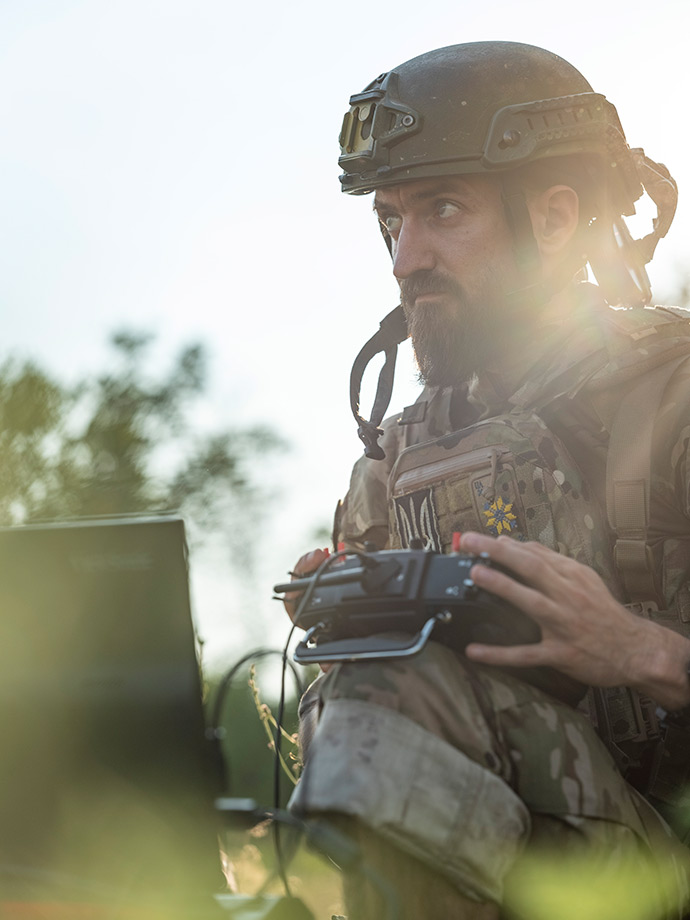
When was the toughest time for him during the war? When you ask this question, you expect to hear about the bombardment at Bazaliivka, perhaps, or the battle for Bakhmut.
Ajax pauses briefly before replying: "The toughest time is probably now. More and more of my friends are dying, while fewer and fewer people are serving. I get angry when I think about it. Since being wounded and concussed, I’ve started to experience difficulty with empathy in general. And it's not just me. Dzhyn says it’s the same for him too…"
Dzhyn does not deny that he also has "problems with empathy", but he is convinced that these problems have nothing to do with concussion and doesn’t believe these are serious problems at all. "It’s just a complex life experience that inevitably leads to an empathy gap," he says, giving his opinion as someone who has read specialist literature on the subject.
It’s not clear whether Ajax has read any specialist literature, but he has sought help from a psychotherapist. Has it been beneficial?
"Yes," he answers. "It’s really important for me to hear at least once a year that I am normal. To hear it from a professional…"
A few seconds later, he continues: "You know, the first year of the war, I thought that the most important thing in these circumstances was to remain myself...."
When he says this, with a melancholy expression, you can see the forest elf Legolas in his eyes. Then all of a sudden he turns into Gandalf. The wise Gandalf completes the stalled thought: "Then I realised that this is impossible; war changes us dramatically. Now it seems to me that the most important thing is to stay human."
Ajax is 33, and the war is most likely only a small part of his life story, which will eventually resemble Tolkien's entire trilogy. But it’s a lengthy and essential chapter about the banality of heroism, which is dissolved in everyday work. Although Ajax finds the word "heroism" irritating: "In war there is no place for heroism. Results on the battlefield are achieved by hard, painstaking work."
The results of his work would take a long time to list. But what does Ajax himself consider his most significant achievement? His answer is brief: "The thing I’m proudest of is that I was able to save several people."
P.S. While this piece was being written, Captain Taras "Ajax" Shandur was awarded the Order of Bohdan Khmelnytskyi, Third Class.
Author: Dmytro Fionik, Ukrainska Pravda
Translation: Sofiia Kohut, Tetiana Buchkovska and Theodore Holmes
Editing: Teresa Pearce